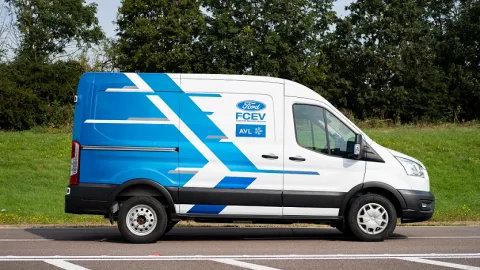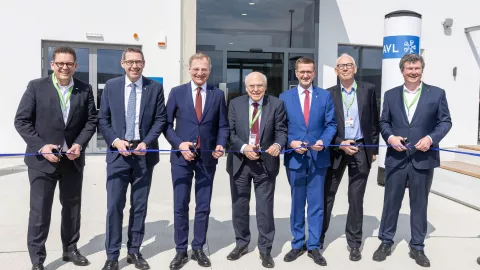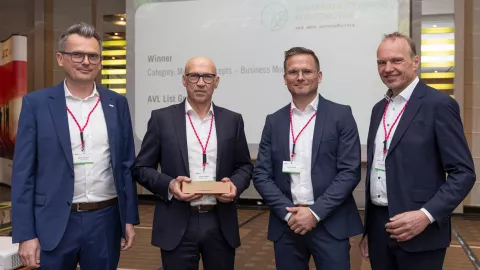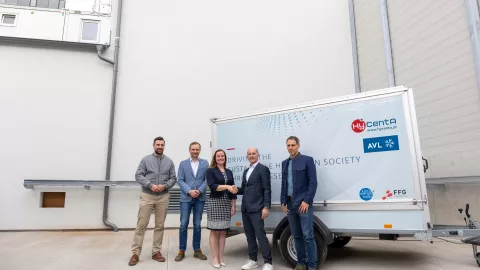AVL and Ford Develop Fully Operational Transit Fuel-Cell Electric Light Commercial Vehicle Demonstrator in Under 12 Months

Basildon, United Kingdom, November 2021: The transportation industry contributes to the amount of global CO2 emitted. As the industry embarks on the UK Government’s “Net-Zero” commitment by 2050, it is important that the propulsion technologies selected and developed become part of the solution to achieve net-zero mobility.
Funded by the Advanced Propulsion Centre (APC), under the Advanced Route to Market Demonstrator (ARMD) competition, AVL and Ford have successfully completed the FCVGen1.0 project in the UK. Achieved in under 12 months, the project aimed at developing a fully functional prototype transit fuel-cell electric commercial vehicle, and to create a digital twin of the demonstrator vehicle, which is fully validated to capture the key functional features of the physical prototype.
The vehicle was in part built and developed in AVL’s Engineering Centre Basildon, equipped with a H2 Cube enabling safe and efficient hydrogen propulsion development. AVL in the UK were responsible for work packages including:
- Designing, specifying and integration the fuel cell Balance of Plant (BoP) and high pressure H2 storage system, including supplier selection and component procurement
- Full system and performance simulation using AVL CRUISETM M
- Rapid prototype fuel cell stack and hydrogen tank (including infra-red comms system for fast re-filling) control systems
- Fuel cell calibration optimisation in a dedicated AVL test cell at AVL headquarters in Graz using the AVL CAMEOTM methodology
- Fuel cell system including high pressure H2 storage build and integration into vehicle
- Vehicle benchmarking with AVL-Drive™
- Human-Machine Interface in vehicle display
Ford provided a donor prototype BEV transit vehicle, and led key vehicle controls and calibration development, including energy management. Ford were also instrumental in CAD, project management, and procurement and build definitions, amongst other contributions.
The project has consolidated AVL Powertrain UK Limited’s fuel cell capabilities across a number of disciplines including component and system design, control system development and functional safety, development of simulation tool sets and system integration, physical build and commissioning.
Learnings from the project demonstrates that hydrogen and fuel cell propulsion can offer an alternative to achieve zero-emission tailpipe solutions in the light commercial sector, whilst at the same time delivering the quick and convenient filling experience of a petrol or diesel vehicle.
Dr. Bernadette Longridge, Engineering Centre Manager, AVL Powertrain UK: "The collaborative project has allowed us to demonstrate that fuel cell electric vehicles can become an integral part of the solution to enable a net-zero future. I am very proud to have been part of a team that has delivered an exceptional FCEV demonstrator in a light commercial vehicle and a digital twin model of the vehicle and fuel cell system in under 12 months. The collaboration between Ford and AVL supported the delivery and achieving the project goals. A great project delivered by an extraordinary team."
Simon Palmer, Chief Engineer Powertrain, Ford of Europe, earlier quoted: “We see opportunities in commercial vehicle as applications where our customers will have a compelling business case to switch to hydrogen. For Ford, the project explored how we apply hydrogen technology in the most efficient, most cost-effective way. We have always been active in hydrogen globally. For us really, it’s all about trying to understand where this technology might sit in our commercial vehicle offering. We are taking stepping stones with new technology.”
With more than 12,200 employees, AVL is one of the world's leading mobility technology companies for development, simulation and testing in the automotive industry and in other sectors such as rail, shipping and energy. Based on extensive in-house research activities, AVL delivers concepts, technology solutions, methodologies and development tools for a greener, safer and better world of mobility and beyond.
AVL supports international partners and customers in sustainable and digital transformation. The focus here is on the areas of electrification, software, AI and automation. AVL also supports companies in energy-intensive sectors on their way to green and efficient energy generation and supply.
AVL's passion is innovation. Together with an international network of experts spanning 90 locations with more than 50 competence and development centers worldwide, AVL is driving the future of mobility. In 2024, the company generated a turnover of 2.03 billion euros, of which 11% was invested in R&D activities.
For more information: www.avl.com
Ford has been sales leader in the U.K. for passenger vehicles and commercial vehicles for 42 and 53 consecutive years, respectively. A Ford model has been the country’s best‐selling passenger vehicle for 45 years, with Fiesta being the country’s top‐selling vehicle for the last 11 years. Ford employs close to 9,000 people in the UK. Diesel engines are manufactured and exported to 15 countries from the Dagenham Engine Plant in London; the Daventry Parts Distribution Centre in Nottinghamshire provides vehicle parts for Ford’s dealerships across the U.K.; Ford Mobility is based at Here East in the Queen Elizabeth Olympic Park in London and the Ford Britain Dunton Campus headquarters in Laindon, Essex, is home to the Ford of Britain national sales company, Ford’s European commercial vehicle business group, light commercial vehicle engineering, powertrain engineering and Ford Credit Europe.




Stay up-to-date as a journalist with our latest press releases concerning company updates, research projects, our latest developments, and more.
Download our fact sheet to get a comprehensive overview about what we do as well as our latest company figures.